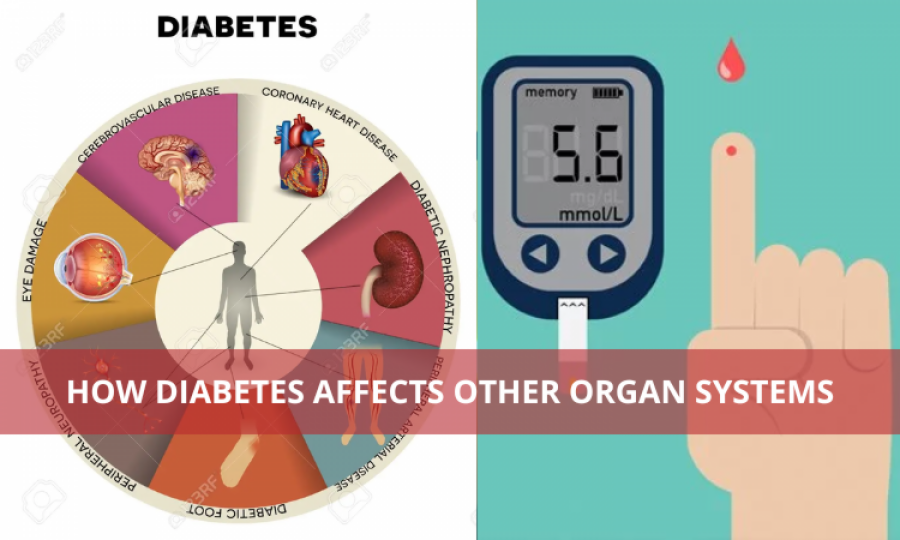How Diabetes Affects Other Organ Systems

Diabetes affects every organ because of blood circulation. The blood sugar and insulin in the circulatory system break down the body's defence mechanisms. The heart doesn't pump blood well enough, and because of this, all the other vital organs are affected. The complications of diabetes include loss of consciousness, excessive thirst and urination, visual disturbances, risk of stroke, sweet smelling breath, pancreas malfunction, and protein in the urine, risk of infections, high blood pressure, nerve damage, foot problems, dry, cracked skin, ketoacidosis and damaged blood vessels. This is proof that diabetes can lead to a multitude of problems. We will discuss how exactly diabetes damages different organs in the body.
Kidney damage: Diabetes can impair the kidney's ability to filter waste products from your blood. Impaired kidney function signs can be microalbuminuria or elevated protein levels. When kidney disease is related to diabetes, it is termed diabetic nephropathy. The doctors then treat the kidneys to prevent kidney failure in the patient.
Brain damage: The nerve damage caused by diabetes is termed diabetic neuropathy. Perception of all bodily sensations, such as hot, cold, pain, and touch, is impaired. This is why diabetic patients do not realize they have gotten cuts and skin wounds because they cannot feel pain.
Eye damage:
Diabetic retinopathy occurs when eye troubles happen because of diabetes. It can lead to cataracts or glaucoma, or even blindness in severe cases. It starts with mild symptoms, and as diabetes worsens, so do the eyes.
Urinary problems:
The blood sugar in the blood can trick the urinary bladder into holding a lot of urine, disturbing the patient. Patients have interrupted sleeping patterns and are often lazy and tired throughout the day. Another problem could be a leaky bladder because of the inability of the patient to feel pressure or pain; they do not realize their bladder is full. Urinary tract infections are a common occurrence in diabetic patients.
Mental health:
Diabetic patients are twice or thrice more likely to be depressed. The condition itself is so stressful, and when it is coupled with other co-morbidities, it becomes immensely difficult to manage. Patients must take care of their mental and emotional well-being and seek help whenever possible.
Immune system: Immunity is understandably compromised in diabetic patients. The white blood cells cannot function properly in the presence of glucose, leading to poor infection control. The consequences are impaired wound healing, delayed healing, and prone to infections.
Skin complications:
Typical skin presentation of a diabetic patient is acanthosis nigricans, which are dark thick and raised patches on the back of the neck, armpits and between thighs which occur in obese patients. Apart from this, skin becomes dehydrated, patchy, bruised and dull. All the internal disruptions show up on the skin.
In conclusion, a diabetic patient should undergo an annual screening of all the organs and keep all the bodily changes under observation. It is essential to prevent these complications by reversing the condition and returning to a healthy life.
Trending
Popular
Dow University’s new rabies vaccine is just a phone call away
-
IRD role lauded in advancing ...
02:53 PM, 12 Mar, 2024 -
Over one billion people worldwide ...
09:48 AM, 5 Mar, 2024 -
'Artificial tongue' introduced to ...
03:38 PM, 4 Mar, 2024 -
Health Alert: Dried fruits found to ...
11:47 AM, 2 Mar, 2024




